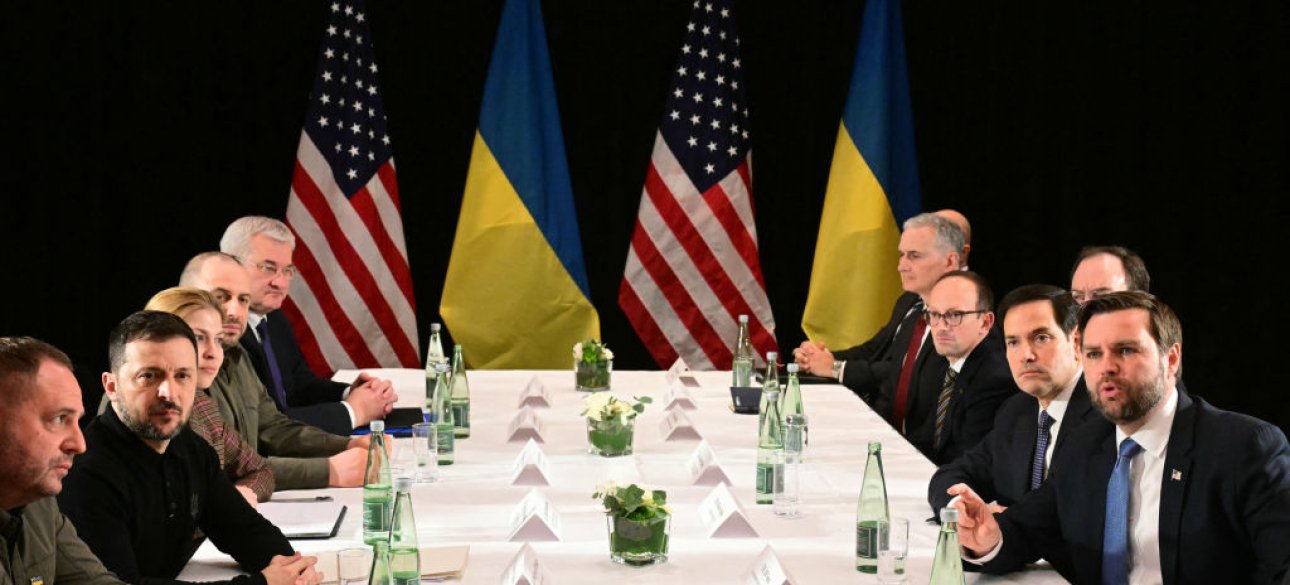
Many were surprised why it happened and why happened right now? In fact, we should not be surprised, we were on the list in which Denmark (due to Trump's encroachment on Greenland), Canada, Mexico, Panama, and in a broad context - all of Europe (except for the right -winger allies of the Trump team) appeared. Sooner or later, aggressive pressure from Trump had to manifest itself in relation to Ukraine.
It is the essence of the Trumpistic outlook and the peculiarity of its policy: the main thing is money; And this money should be knocked out from those who are weaker and dependent on the US.
The immediate reason for the aggressive statements of Trump and high-ranking officials from his administration was the refusal of President of Zelensky to sign a bondal agreement on the strategic resources of Ukraine, and the formal reason was the criticism of Zelensky negotiations in the US and Russia in Riyadh. Trump does not like it when he is denied, and even more when he is criticized. Well, and then - it went. I will not repeat what everyone has heard and seen.
However, the aggressive wave of Washington towards President Zelensky is also already tested (in other countries) tactics of aggressive pressure on the Ukrainian leadership in order to force Kiev before signing the resource agreement proposed by the United States. But it should be understood that the matter is not only Trump's annoyance about Zelensky, but not only in the effort to sigwered us before signing a resource agreement.
It is already obvious that the US policy to us, to Russia, to Europe, is significantly changing. And this is noticeable not only on the rhetoric of Trump, but on the specific actions of the United States in the UN, in negotiations with Russia, and relations with us, etc. Agreeing with Russia for Trump is more important than negotiating with us. And we have to pay Trump on the accounts for providing us as free and irreversible help. The US approaches to its foreign policy are changing dramatically.
Liberal-democratic values are rejected (or replaced by a completely different-mercantile-conservative and selfish interpretation those who have traditionally been strategic competitor, and even the enemy of the United States. Why should this be aware? Because we will still have to look for the optimal balance between tactics and strategy in relations with the United States in the context of our confrontation with Russian aggression.
Now we need to relieve conflict tension around the topic of a resource agreement and in general in relations with Trump and its administration. Apparently, you will have to make some concessions to the United States on a resource agreement to save Ukraine even just an opportunity to buy US weapons. But the former free military assistance will no longer be. And the economic assistance from the US can not dream.
Who knows what concessions will be demanded from us for the formal termination of the war in Ukraine? And in this matter, we probably have to make unpleasant compromises. And God forbid that it would still be compromises, not unilateral concessions in Ukraine. And among the likely requirements may be those that will be absolutely unacceptable to us, for example, the recognition of occupied territories in Russian.
I draw attention to these circumstances in order not to have illusions that you can return to the former partnerships with the United States. Partnership, if it is, is situational and inertial. And it will fight for preserving at least the remnants of partnerships. The Trump administration will not consider us as partners, especially strategic ones.
The attitude to us will be as a trading object with Russia and to a resource asset (and well, if for the future, and can simply be a source of cost compensation that was before).
What conclusions can we draw from the current (already new) situation in our relations with the United States? This situation can change to some extent (and in the negative, and maybe in a positive way, if Trump misses a little and it will be profitable to support Ukraine a little), it will even swing like on American (Trump) slides, but the main trends that are about which I said above, already obvious.
From the point of view of current tactical interests, we now have and even must look for certain, relatively acceptable compromises with the Trump Administration on a resource agreement, on the conditions of completion of the Russian-Ukrainian war and on some other topics. Some of these compromises may be painful for us. However, we cannot (even if we really want) to send Trump to three devils, as some offer.
The negative consequences will then be very large for us, especially in terms of influencing the military situation. So far we are too dependent on the US. Therefore, you will have to show flexibility. In the context of a longer perspective, we need to understand that at least during the Trump presidency, we inevitably lose the United States as the main strategic partner of Ukraine, including in military-political confrontation with Russia.
However, this process should be stretched over time and minimizing its negative effects. At the same time, we need to think about forming a new security strategy. At the moment, there is only one thing - our main strategic partner will become European countries in the future (of course, with some exceptions and possibly a little in a different form than it is now).
We have joint challenges (new US foreign and security policy in Trump) and problems (Russian aggression), they are simply more expressive and dangerous for us. But you will also have to look for additional fuses and counterwear to reduce the threats from Russia and further rapid fluctuations in the international political situation, including the US with Trump Presidency. The author expresses a personal opinion that may not coincide with the editorial position.










All rights reserved IN-Ukraine.info - 2022